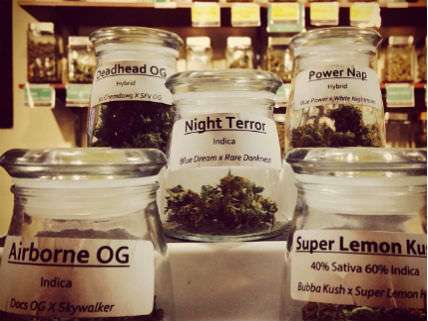Another Study Finds No Evidence That Medical Marijuana Increases Cannabis Consumption by Teenagers

A few weeks ago, in a column about the impact of marijuana legalization, I noted that there is not much evidence to support the frequently voiced fear that allowing medical use encourages teenagers to smoke pot. A new study by three economists reinforces that point, finding that the adoption of medical marijuana laws is not associated with increases in cannabis consumption by high school students. "Our results are not consistent with the hypothesis that legalization leads to increased use of marijuana by teenagers," write D. Mark Anderson of Montana State University, Benjamin Hansen of the University of Oregon, and Daniel Rees of the University Colorado in a working paper published by the National Bureau of Economic Research.
Anderson et al. used data from three sources: the National Youth Risk Behavior Survey, the National Longitudinal Survey of Youth, and the Treatment Episode Data Set. "These analyses provide further evidence that youth marijuana consumption does not increase with the legalization of medical marijuana," they write. "Our results are not consistent with the hypothesis that the legalization of medical marijuana caused an increase in the use of marijuana among high school students. In fact, estimates from our preferred specification are small, consistently negative, and are never statistically distinguishable from zero."
The impact of general legalization, of course, might be different. Assuming that legal marijuana businesses in places such as Colorado and Washington eventually displace the black market, teenagers will find it harder to buy pot directly, since licensed sellers, unlike your average street dealer, check IDs to make sure buyers are at least 21. But it may become easier for teenagers to obtain pot indirectly, via legal buyers. Still, Anderson et al.'s findings are significant, because in some states (including Colorado, Washington, and California) the rules for obtaining medical marijuana are loose enough that it's easy for recreational consumers to pose as patients. In fact, critics commonly complain that medical marijuana in those states is legalization by another name. Rees nevertheless told The Washington Post that the overall results of this study hold true for individual states as well. "No single state stood out," he said. "The effect of passing a medical marijuana law on youth consumption appears to be zero across the board."
Editor's Note: As of February 29, 2024, commenting privileges on reason.com posts are limited to Reason Plus subscribers. Past commenters are grandfathered in for a temporary period. Subscribe here to preserve your ability to comment. Your Reason Plus subscription also gives you an ad-free version of reason.com, along with full access to the digital edition and archives of Reason magazine. We request that comments be civil and on-topic. We do not moderate or assume any responsibility for comments, which are owned by the readers who post them. Comments do not represent the views of reason.com or Reason Foundation. We reserve the right to delete any comment and ban commenters for any reason at any time. Comments may only be edited within 5 minutes of posting. Report abuses.
Please to post comments


It was my experience, back in the day, that the only thing that could "Increase Cannabis Consumption by Teenagers" was more available cash or cheaper cannabis.
Does "Night Terror" refer to what it's supposed to cure, or what it will give you? (Sorry, I'm a noob to this stuff.)
The weed was harvested at night in a swift, terrifying raid on the hydroponics shed.
It refers to the color. It's dark purple, almost black. It can also paste you to a comfortably-curved rock, staring at the Cathedral in RMNP for 45 minutes, and make you resolve to only being sativas hiking from now on.
"Night Terror" refers to the fact that, by smoking this, you will be forever crippled in your ability to work the high paying job that funds Obama's plan for America through progressive taxation. This alone should keep you up at night.
Prohibitionists like Kevin Sabet and Patrick Kennedy will need to update their websites and propaganda or look even more like the bought-and-paid-for fools they are.